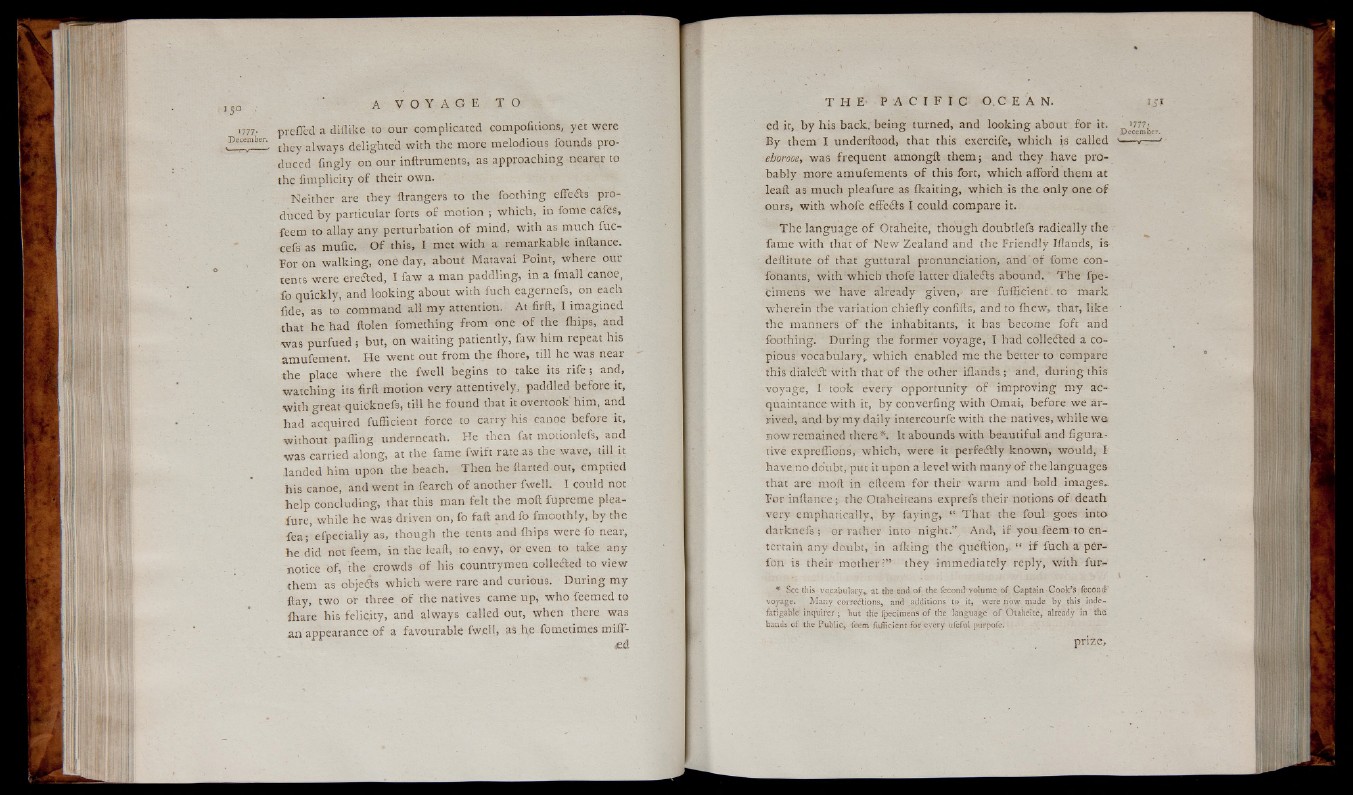
prefled a diilike to our complicated compolitions, yet were
they always delighted with the more melodious founds produced
fing ly on our indruments, as approaching nearer to
the fimplicity o f their own.
Neither are they ilrangers to the foothing effedts produced
by particular forts o f motion ; which, in fome- cafes,
feem to allay any perturbation o f mind, with as much fuc-
ce fs as mufic. O f this, I met with a remarkable inftance.
For on w a lk in g , ond day, about Matavai Point, where our
tents were eredted, I faw a man paddling, in a fmall canoe,
fo q u ick ly, and lo okin g about with fuch eagernefs, on each
lide, as to command all my attention. At firft, I imagined
that he had itolen fomething from one o f the {hips, and
w a s p u rfu ed ; but, on waiting patiently, faw him repeat his
amufement. He went out from the fhore, till he was near
the place where the fwe ll begins to take its rife ; and,
w atchin g its firft motion very attentively, paddled before it,
w ith great quicknefs, till he found that it overtook' him, and
had acquired fufficient force to carry his canoe before it,
w ithou t paffing underneath. He then fat motionlefs, and
was carried along, at the fame fw ift rate as the wave, till it
landed him upon the beach. Then he darted out, emptied
his canoe, and went in fearch o f another fwell. I could not
help concluding, that this man fe lt the mod fupreme plea-
fu re , while he was driven on, fo fa ll and fo fmoothly, by the
fea ; efpecially as, though the tents and ihips were fo near,
he did not feem, in the lead, to envy, or even to take any
notice of, the crowds o f his countrymen collecded to view
them as objeils which were rare and curious. Du rin g my
d a y , two or three o f the natives came up, w ho feemed to
lhare his felicity, and always called our, when there was
a n appearance o f a favourable fwell, as he fometim.es u n ified
I i
ed it, b y his back, b e in g turned, and lookin g about fo r it.
By them I underdood, that this exercife, w hich is called
ehorooe, was frequent amongd th em ; and they have probably
more amufements o f this fort, w h ich afford them at
lead as much pleafure as ikaiting, w hich is the only one o f
ours, with whofe effedls I could compare it.
T h e langu ag e o f Otaheite, though doubtlefs radically the
fame with that o f New Zealand and the Friendly Iilands, is
deditute o f that gu ttu ral pronunciation, and o f fome con-
fonants, w ith which thofe latter dialedts abound. T h e fpe-
cimens w e have already given,- are fufEcien t. to mark
wherein the variation chiefly confifls, and to {hew, that, lik e
the manners o f the inhabitants, it has become foft and
foothing. Du rin g the former voyage , I had collected a copious
vocabulary,. w hich enabled me the better to compare
this dialed! with that o f the other iilands and, during this
voyage, I took every opportunity o f improving my acquaintance
with it, by converling with Omai, before we arrived,
and by'my daily intercourfe with the natives, while w a
now remained there*. It abounds w ith beautiful, and figu ra tive
expreflions, w hich, were it perfectly known, would, I
have no doubt, put it upon a level w ith many o f the languages
that are mod in efleem for their warm and bold images-
For i n f la nc e the Otaheitcans exprefs their notions o f death
very emphatically, b y faying, “ T h a t the foul goes into
darknefs ; or rather into n ight.” , And* i f you feem to entertain
any doubt, in aiking the quedion,. “ i f fuch a pdr-
fon is their mother r” they immediately reply, w ith fur-
1777 -
December.
* See this vocabularyv a t the end o f the fecond' volume o f Captain C ook ’S fecond-'
voyage. Many corrections,, and additions, to it, were now made, by this indefatigable
inquirer; but the fpecimens o f the language o f Otaheite, already in the
hands o f the Public, feem fufficient for every ufeful piirpofe. | •
prize,